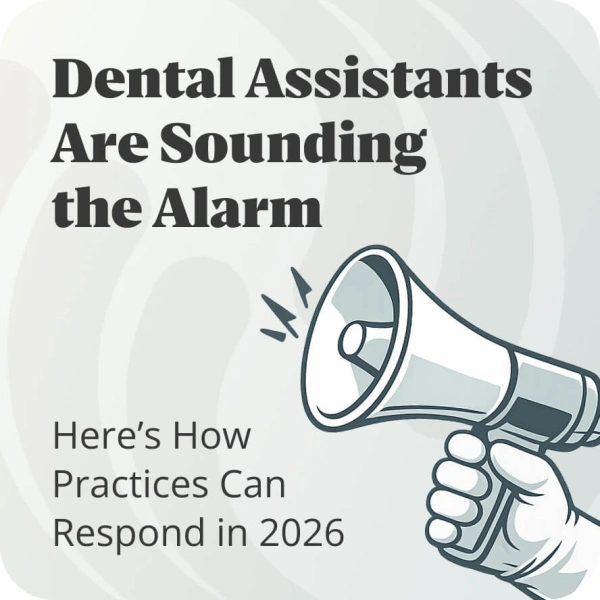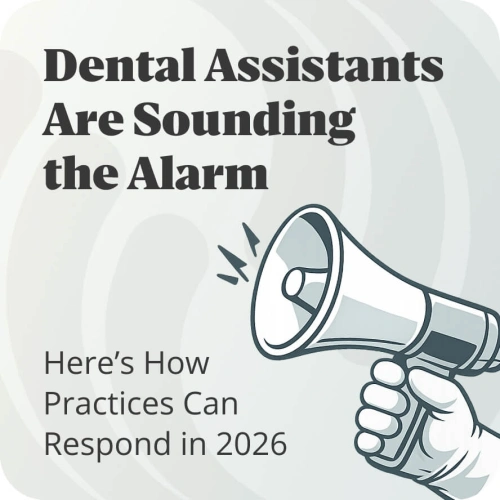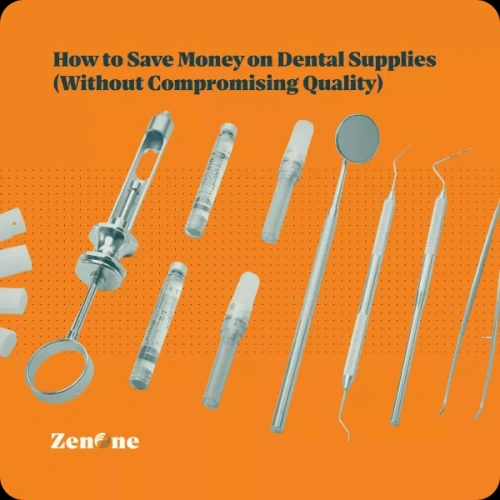Miranda Moore
RDA Lead Assistant, Beacon Dentistry
Dental Assistants: How to Communicate More Effectively with Your Doctor/Employer
Many dental assistants that I interact with share with me that they have difficulty communicating with their doctor(s)/employer(s). As a result, they become unhappy with their jobs, less productive, and in some cases, leave the practice. Working in dentistry can be stressful under the best of circumstances. And when the circumstances are not optimal, effective communication between doctors and all team members is critically important. Experts in communication and performance agree that “better communication techniques help employees to better comprehend their roles, which in turn helps employees perform their assigned duties better. Resources and time can be saved through these techniques, therefore getting more work done and reducing stress” Assuming that the experts are correct, why don’t dental teams, particularly dental assistants and dentists practice better communication methods? Let’s explore how to enhance communication between dental assistants and doctors to increase productivity and decrease stress.
Barriers to Communication:
For dental assistants, there are several potential barriers to greater effectiveness in communicating with their dentist/employer. First is the dynamic of self-confidence. Currently, many dental assistants come to work in a practice with little or no experience. It can be difficult to approach a highly educated dentist with questions or concerns. Even experienced dental assistants have some challenges in approaching their doctors, who are not only the authority figure in the practice, but also the person who signs their paycheck. Over time, team members take on the attitude that they just need to accept how things are because they believe that their doctor(s) would not listen to their concerns or requests.
Time works against effective communication in many dental practices. The pressure to stay on schedule while delivering quality patient care is stressful and can result in stressful reactions when running behind or treatment not going as planned. When under stress emotion takes precedence over logic when individuals interact with each other.
Yet another barrier to communication that occurs frequently is a doctor/employer that has a non-confrontational behavioral style and avoids situations where issues may need to be discussed. This type of behavior is frustrating to the team members and may be perceived as a personal issue i.e., the doctor doesn’t like them or is unhappy with them.
There are other barriers to effective communication, such as gender, race, cultural issues, socioeconomic differences, and family situations. The bottom line is that no matter what the barriers, dental assistants can be proactive in improving communication by following some specific steps to ensure successful and productive discussions with their doctor/employer.
Step 1 – Evaluate the Situation
Decide if the issue is urgent or if it can wait. An urgent issue would be one that would affect the patient currently being treated or a patient scheduled later that day. Another example would be an issue that arises with a team member who may not be able to perform their job, or who is acting in an offensive or appropriate matter. The latter also applies to patients behaving inappropriately. It these cases, it is in the best interest of the team to stop, take a breath and deal with the situation. This needs to be done in private, with the affected parties present, not in front of patients or the entire team. If the issue is not urgent, but the assistant believes it needs to be addressed, wait until a later time on that day to approach the doctor for a discussion. Attempting to talk to the doctor in between patients may not be the best time since their focus is on the patients, so finding a time during lunch break or at the end of the day may be more productive.
Just because a dental assistant (or any team member) has an issue to discuss, it doesn’t necessarily mean that the doctor needs to be involved. Each team member should think about whether the issue is just a personal issue, or if it does affect patients and the team. If the latter is true, then the doctor needs to be involved in the discussion. If it is a personal issue, some introspection is in order before any resolution can be achieved. If, for example the dental assistant just doesn’t like or get along with another member of the team, s/he should approach that person first to find some common ground. Avoid putting the doctor in the middle! If the dental assistant wants to change how things are done, such as ordering supplies, then s/he must first decide if they just want their way or can the practice benefit from the change. In other words, we sometimes just need to get over our bad selves and realize that we don’t work in a perfect world, with everything the way we want it.
Step 2 – Develop a Plan/Strategy
After analyzing an issue, the dental assistant should develop a strategy for communicating with the doctor about it. This would include answering these questions about the anticipated discussion. What is the desired outcome from the meeting? Do you need an answer soon or will it wait? What type of information or documentation would help to support the dental assistant’s position? For example, if a dental assistant needs a new operatory stool, have ready a list the reasons (back pain, inability to adjust an old stool, etc.) and convey a benefit to the doctor, e.g., increased ability to see in the patient’s mouth during treatment. How would the doctor, patients, team, and the dental assistant from resolving the issue? Could a free trial of a new type of stool be arranged? Or is there a dental meeting that the team will be attending, where some research can be gathered? If a specific stool is desired, be prepared to share information on the stool, including the model and price. It is helpful to keep in mind that the doctor will want to know how they and/or the practice will benefit from any proposed change. The doctor may also question the validity of the issue – so be prepared. If the doctor says no to a specific request, a good reply is: “Is that no for now, or it is no forever?”. Practice saying this ahead of time.
Step 3 – Select a Time and Place to Approach the Doctor
Once prepared, be sensitive to the busyness in the practice on a given day, and other issues that may affect the doctor’s receptiveness to meet. Trying to grab the doctor’s attention as s/he is in the middle of the busy workday isn’t usually successful. A better time might be before the workday starts, during lunch, or at the end of the day. Make it easy for the doctor – keeping in mind that they may be fearful of a confrontation, or of being dragged into the drama that may be occurring among the team members. If the doctor states that it isn’t a suitable time to talk, ask when a suitable time might be. If the doctor won’t commit to a time, make another attempt the next day. If the doctor keeps putting off the conversation, that may be a sign that the doctor is avoiding the discussion.
Step 4 – Get to the Point
Once the doctor and assistant agree on a time to meet, don’t waste time on small talk, which individuals do sometimes when they are nervous. Get to the point – tell the doctor what the conversation is about, define the issue or problem, and present a solution (e.g., buy a new stool). Be open to listening to the doctor’s responses and answer questions when asked. Again, keep in mind that the doctor will want to know how an issue, change or purchase will benefit the practice and him/herself. Try to avoid becoming defensive of accusatory. Stick to the facts or data. As stated previously, if the answer is no to a request, ask if that is the final answer, or can the request be revisited in the future.
Be sure to thank the doctor for meeting and listening to the concerns. Don’t walk away angry or with a bad attitude. That discourages the doctor from wanting to have future discussions or possibly reconsidering a request.
Final Thoughts
If a dental assistant is continually struggling to communicate with the doctor or other team members – ask them what to do to communicate better. Also ask what not to do to communicate better with them.
Sometimes dental assistants are not a good fit on a particular team. If that is the case, seek out a team where the team culture is a better fit.Whining and gossip have no positive effects on team morale and shouldn’t be part of the culture of a dental practice.Remember that perception is different for everyone. We don’t all see situations the same.Remember that it is better to be kind than to be right in some situations.
It is my hope that these thoughts give some insight into making conversations between dental assistants and doctors – and other team members a little more comfortable. Discussing concerns or issues is the first step to resolving them. Letting the issues go because of fear of bringing them up in a conversation doesn’t make the situation go away, in fact it may make it worse. Be positive and expect good outcomes.
References
Allaya Cooks-Campbell, BetterUp, “Communication is Key in the Workplace. Here’s How to Improve. https://www.betterup.com/blog/why-communication-is-key-to-workplace-and-how-to-improve-skills.
Join 1000+ dental professionals, shop from your favorite
suppliers, compare prices instantly, and save over $17,000/year
Try our platform free for 14 days.
Get the latest ZenOne updates and product launches in your inbox
Don't miss the latest news!
Receive exclusive offers and news straight to your inbox!
Continue reading
Let's discover how we can help you

Tiger Safarov
Hi, I'm Tiger, the CEO at ZenOne, and I'm happy to personally ensure your success with ZenOne. Send me your latest invoice or a statement for a Free Savings Analysis.
Ask me a question:






